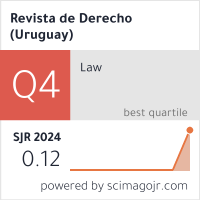The importance of a human approach to people management during a pandemic
DOI:
https://doi.org/10.47274/DERUM/39.5Keywords:
People management, Business organization, Company, Pandemic, PeopleAbstract
The COVID-19 pandemic has impacted societies causing important and unthinkable changes in our daily lives.
The need to adapt to this new reality has been an inevitable situation, gradual and in some cases abrupt. During these challenging times, the workplace and the business world have particularly been stages for significant changes.
In this context, businesses are in need of exploring new ways of functioning and organizing themselves. As a result, companies have had to constantly change structurally. The key for overcoming, managing and mitigating a crisis situation and its negative impacts is by having a good and human approach to people management in the workplace.
Downloads
References
Bennis, W. y Nanus, B. (1985) Leaders, the strategies for taking charge. Harper & Row.
Bohórquez Arévalo, L. (2013) La organización empresarial como sistema adaptativo complejo. Estudios Gerenciales 29. DOI: 10.1016/j.estger.2013.05.014. Disponible en: https://www.researchgate.net/publication/274903650_La_organizacion_empresarial_como_sistema_adaptativo_complejo
Chung, V. M. y Espinoza, J. L. (2020) Efecto mediador de la cultura organizacional en la relación entre el liderazgo transformacional y la gestión del conocimiento. Rev. Tzhoecoen. Julio - septiembre. Vol. 12 / Nº 3.
Drucker, P. (1999) Management Challenges for the 21st Century, PerfectBound. ISBN 0-06-0546794. Disponible en: http://103.5.132.213:8080/jspui/bitstream/123456789/1378/1/Management%20Challenges%20for%20the%2021st%20Century%20%28%20PDFDrive.com%20%29.pdf
Drucker, P. (2011) Gestionarse a sí mismo. Harvard Business Review, ISSN 0717-9952, Vol. 89, Nº. 11. Disponible en: https://pdfcoffee.com/articulo-gestionarse-a-si-mismo-peter-drucker-hbr-2011-pdf-free.html
Friedman, S. Groot, J. y Christesen P. (1996) Nuevas ideas de management ´Un equilibrio entre el trabajo y la vida. Revista Expansión, 1996, en “Gestionar el cambio” Departamento de Economía y Organizaciones de Empresas, Universidad de Barcelona, Tesis Doctoral Llanos Tarruella Caballero, Barcelona.
García, J.J. (1996) Valores son acciones. Conecta. Montevideo.
Gómez-Tabares, A. & Narváez, M. (2020). Tendencias Prosociales y su Relación con la Empatía y la Autoeficacia Emocional en Adolescentes en Vulnerabilidad Psicosocial. Revista Colombiana de Psicología, 29, (2),1 25-1 47. Disponible en: https://doi.org/10.15446/rcp.v29n2.78430
Kofman, F. (2007) Metamanagement. La nueva conciencia de los negocios. Tomo I, Granica.
Larki, T.J. y Larkin, S. (1996) Reaching and changing frontline employees. En Harvard Business Review Effective Communication. Disponible en: https://hbr.org/1996/05/reaching-and-changing-frontline-employees?language=es
López Posada, L. M. (2016) Cultura organizacional: entre el individualismo y el colectivismo”. Ibagué, Colombia: Sello Editorial Universidad del Tolima.
McGregor, D. (1966) El lado humano de las organizaciones, Mc Graw-Hill.
Mercadal, T. (2020) Cultura organizacional. De: Salem Press Encyclopedia,. Disponible en: http://search.ebscohost.com.sire.ub.edu/login.aspx?direct=true&db=ers&AN=94895786&lang=es&site=eds-live
Organización de las Naciones Unidas (2020). Respuesta con igualdad de género en el ámbito laboral. Disponible en: https://www.gub.uy/ministerio-trabajo-seguridad-social/sites/ministerio-trabajo-seguridad-social/files/documentos/publicaciones/DocumentoCOVID19_adaptadoURY_v3.pdf
Pérez López, J. (1998) Liderazgo y ética en la dirección de empresas. La empresa del siglo XXI, IESE Business School Barcelona.
Real Academia Española. (s.f.). Empatía. En Diccionario de la lengua española. Recuperado el 29 de abril de 2020, de https://dle.rae.es/cultura?m=form
Valencia, A. (2017) Subjetividad y poder en la organización empresarial: un estudio de caso. Innovar, 27 (65).






















 This work is under a
This work is under a 